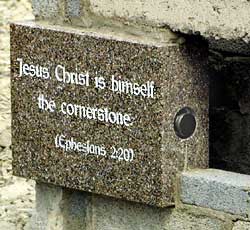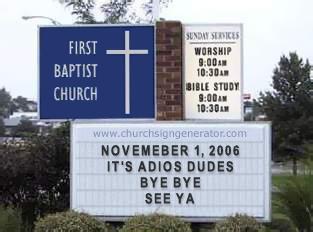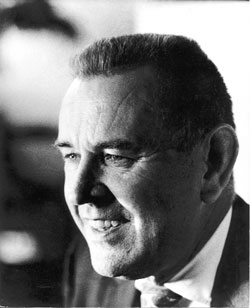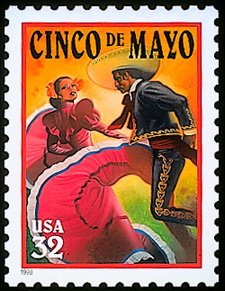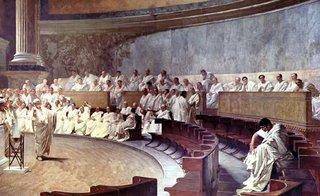 Al Mohler is a constant source of common Christian sense. Here's his timely daily column:A Response to "The DaVinci Code": What's the Problem?
Al Mohler is a constant source of common Christian sense. Here's his timely daily column:A Response to "The DaVinci Code": What's the Problem?Since its release in 2003, forty million hardback copies of The Da Vinci Code have sold. Six million paperback copies also are now in circulation, and this weekend, a major Hollywood movie will be released. In both the book and the movie, the central character is one who does not actually appear in either, and that is Jesus Christ. Because of that, many of our friends and neighbors are going to be talking about who Jesus is and why He came. Many of our neighbors are going to be seeing, perhaps for the first time, an explanation about who Jesus is and why He matters, and our great concern is that the entire story presented in this movie is a lie.
The interest in this book and movie should remind us that there is going on right now a spiritual battle, not only between light and darkness, and between the truth and the lie, but also between life and death. Our great concern therefore should not be merely that people might be confused, but that people would be blinded and held captive by a story that appeals to them, and yet a story that is an anti-Gospel, a false gospel, the very thing that the Apostle Paul warned against when he said, "If I or even an angel were to come to you preaching any other gospel, let him be anathema."
You see, sometimes the church does not remember this, but it is the church's responsibility to anathematize. That is something we don't talk about very much, but it is the church's responsibility clearly to declare as false anything which stands against the true gospel of Jesus Christ. We live in a harmonious age when everyone wants to nod at everything, smile appreciatively at everything, and not pass judgment on anything. In the midst of such an age, however, the church is called to say "no" and to identify the false as false. Otherwise we cannot truly honor the truth.Authored by Dan Brown, The Da Vinci Code is a conspiracy story. It is a mystery suspense thriller, and Americans love mystery suspense thrillers. What makes this story different, however, is that the conspiracy theory that lies at the very heart of the book's plotline has to do with the Gospel. What drives the action of the story is the argument that the church's traditional teachings about Jesus are all a fraud. Instead of revealing who Jesus really was and what he really did, the book argues, the church buried the truth in an intentional conspiracy, claimed that Jesus was divine, and said that He had come to save sinners from their sin.
Beginning in chapter 55, Brown gets to the very heart of the story when the central character begins to reveal to another character the truth about the conspiracy. Consider what the character Leigh Teabing says: "The Bible is a product of man, my dear, not of God. The Bible did not fall magically from the clouds, man created it as a historical record of tumultuous times and it has evolved through countless translations, editions and revisions. History has never had a definitive version of the book."
Now if that is true, then we are reading a kind of committee report when we open the Scripture. But it is not true. This is one of those insidious statements that makes sense to sinners, because in effect, that one paragraph has just declared that we do not have to take the Bible as the Word of God. It is just a human document, says the book.
He goes on: "Jesus Christ was a historical figure of staggering influence, perhaps the most enigmatic and inspirational leader the world has ever seen. As the prophesied Messiah, Jesus toppled kings, inspired millions, and founded new philosophies. As a descendant of the lines of King Solomon and King David, Jesus possessed a rightful claim to the throne of the King of the Jews. Understandably, his life was recorded by thousands of followers across the land. More than eighty gospels were considered for the New Testament, and yet only a relative few were chosen for inclusion--Matthew, Mark, Luke and John among them."
The problems here, even from a merely historical point of view, are numerous. First of all, Jesus's life was not recorded by "thousands of followers." Most of the people who lived during that time were illiterate, and they were not going home and writing down gospels or biographies of Jesus. Moreover, the assertion that some sort of committee considered eighty gospels and chose a few--Matthew, Mark, Luke, and John among them--is nonsense. There simply was no committee that sat down with eighty gospels and said, "We like this one, but we don't like that one." Such an assertion has no basis whatsoever in fact.
From here, Brown writes at length about the Council of Nicea in 325 A.D. Here is the central passage: " 'Many aspects of Christianity were debated and voted upon. The date of Easter, the role of the bishops, the administration of the sacraments, and of course the divinity of Jesus.' 'I don't follow, his divinity?' 'My dear,' Teabing declared, 'until that moment in history, Jesus was viewed by his followers as a mortal prophet, a great and powerful man, but a man nonetheless, a mortal.' 'Not the Son of God?' 'Right,' Teabing said. 'Jesus's establishment as the Son of God was officially proposed and voted on by the Council of Nicea.' 'Hold on! You're saying that Jesus' divinity was the result of a vote?' 'A relatively close vote at that,' Teabing added. . . . Many scholars claim that the early church literally stole Jesus from his original followers, hijacking his human methods, shrouding it in an impenetrable cloak of divinity, and using it to expand their own power. I've written several books on the topic.'"
So what was the real story, according to The Da Vinci Code? Dan Brown writes that Jesus Christ was a mortal teacher, that he was in fact crucified, but that before He died he married Mary Magdalene and had a child with her. After the crucifixion, Mary Magdalene and the child went to Gaul, which is now called France, and established the Merovingian royal dynasty. Essentially, Dan Brown wants you to believe, or at least he has written a novel to suggest, that Christianity is based upon a huge lie, that the original historical truth about this mortal prophet was buried by the Emperor Constantine in 325 A.D. in order to bolster the power of his own regime. And thus, Christians throughout the ages have been engaged in an exercise of mass delusion--until now, of course.
So how do we answer this? First, we must remind ourselves of some basic truths concerning how Christianity came to be.
One of the book's claims is that until the Council of Nicea in 325 A.D., the church believed that Jesus was just a mortal prophet. There could not be a bigger historical lie. Consider John 1:1-3: "In the beginning was the Word, and the Word was with God, and the Word was God. He was in the beginning with God, all things were made through Him, and without Him was not anything made that was made. In Him was life and the life was the light of men." Nothing could be clearer than this, and it is the very heart of the Gospel. If we misunderstand who Jesus is, we cannot possibly understand anything else about the Gospel itself.
Moreover, Brown's history of the Council of Nicea is completely misleading. Actually, that Council is one for which Christians ought to be very thankful, for it was there that the church identified heresy as heresy and preserved the Gospel of Christ. In the early fourth century there arose a presbyter in the church of Alexandria by the name of Arius, who began to teach that Jesus Christ was not the pre-existent Son of God, but that there once was a time when the Son was not. On the other side of the controversy was a bishop named Athanasius. Here was a man who understood the truth, and who also understood that his responsibility as a shepherd of the sheep to warn his people about this false teaching. At one point, one of Athanasius's advisers said to him, "Athanasius, the entire world is against you." In reply, Athanasius said, "Well, if the entire world is against Athanasius, then Athanasius will be against the entire world." In Latin, Athanasius' phrase has been summarized as "contra mundum," "against the world." Surely that is one of the greatest statements in the history of Christianity, and Christians should feel invigorated by the courage of Athanasius. If necessary, contra mundum, against the world! If the world is against the Gospel, then the world will have to understand that we must be against the world.
The true story of Nicea, therefore, was not that the leaders of the church came together to declare Jesus divine, but that they came together to guard against heresy and to proclaim the truth as it had been handed to them by the apostles. Brown claims that Jesus's divinity was established by "a relatively close vote at that." Actually, the bishops of the church came together, adopted a creed to separate the truth from the error, and of the more than three hundred bishops in attendance at the Council of Nicea, only two refused to sign that creed. By any measure, three hundred to two is not a close vote.How then should Christians respond when our neighbors ask us, "How do you know that Jesus was never married?" The answer is that we know Jesus was not married because Scripture is very clear that Jesus was not married. Is there a proof-text for that fact? No, but it is written into the very warp and woof of the fabric of the New Testament. Jesus' purpose was not to come and marry and establish an earthly dynasty, but to come and save sinners. There is no wife at the cross; it is Jesus' mother, and she is given into the care of one of His disciples. The entire context there is of one who was not married. Also, of course, had Jesus truly been married, it is impossible that this would not have been recorded and told by the enemies of the Gospel, as well as by its friends.
It is not important that Christians either see this movie or read this book. But it is important that we be armed with enough knowledge of the storyline so that when our neighbors, friends, coworkers, and family members begin talking about this, we can say, "Well, no, I am not shocked to hear that. The church has heard this kind of thing before. I am not shocked to hear that, because there have been efforts in the very beginning of Christianity to subvert the truth with a lie. Even in the New Testament, Paul himself was warning against false gospels."
In fact, Scripture tells us there are many who will prefer a lie to the truth, even a lie that is easily dismissible, even a lie that is transparently false, even a lie that is so undocumented that it simply falls of the weight of its own audacity. There are persons who would rather believe a lie packaged in a glittery Hollywood movie than the truth so plainly revealed in the Word of God.This is an edited version of an address given to the Covenant Life Church in Gaithersburg, Maryland on May 7, 2006. Click here for Dr. Mohler's 2003 review of The DaVinci Code. Tomorrow: A Christian Response to "The DaVinci Code": What's the Attraction?Source: http://www.crosswalk.com/news/weblogs/mohler/?adate=05/19/2006#1397641

